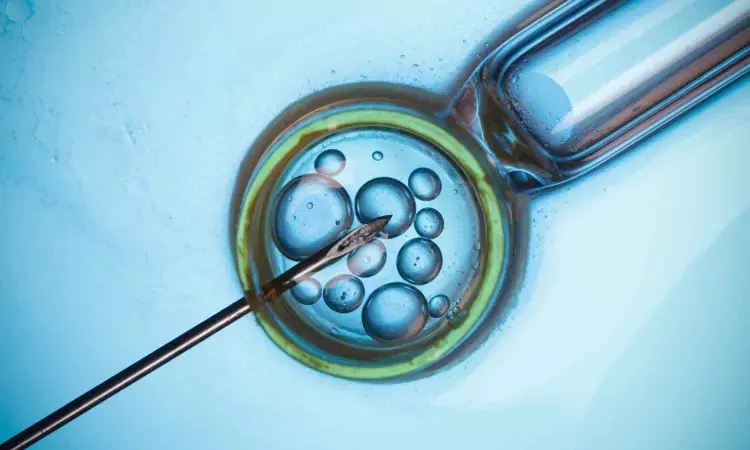- Home
- Medical news & Guidelines
- Anesthesiology
- Cardiology and CTVS
- Critical Care
- Dentistry
- Dermatology
- Diabetes and Endocrinology
- ENT
- Gastroenterology
- Medicine
- Nephrology
- Neurology
- Obstretics-Gynaecology
- Oncology
- Ophthalmology
- Orthopaedics
- Pediatrics-Neonatology
- Psychiatry
- Pulmonology
- Radiology
- Surgery
- Urology
- Laboratory Medicine
- Diet
- Nursing
- Paramedical
- Physiotherapy
- Health news
- Fact Check
- Bone Health Fact Check
- Brain Health Fact Check
- Cancer Related Fact Check
- Child Care Fact Check
- Dental and oral health fact check
- Diabetes and metabolic health fact check
- Diet and Nutrition Fact Check
- Eye and ENT Care Fact Check
- Fitness fact check
- Gut health fact check
- Heart health fact check
- Kidney health fact check
- Medical education fact check
- Men's health fact check
- Respiratory fact check
- Skin and hair care fact check
- Vaccine and Immunization fact check
- Women's health fact check
- AYUSH
- State News
- Andaman and Nicobar Islands
- Andhra Pradesh
- Arunachal Pradesh
- Assam
- Bihar
- Chandigarh
- Chattisgarh
- Dadra and Nagar Haveli
- Daman and Diu
- Delhi
- Goa
- Gujarat
- Haryana
- Himachal Pradesh
- Jammu & Kashmir
- Jharkhand
- Karnataka
- Kerala
- Ladakh
- Lakshadweep
- Madhya Pradesh
- Maharashtra
- Manipur
- Meghalaya
- Mizoram
- Nagaland
- Odisha
- Puducherry
- Punjab
- Rajasthan
- Sikkim
- Tamil Nadu
- Telangana
- Tripura
- Uttar Pradesh
- Uttrakhand
- West Bengal
- Medical Education
- Industry
Fresh embryo transfer may be better for women with low chance of IVF success: Study

Fresh embryo transfer may be a better option than use of frozen embryos for women with a low chance of having a healthy baby by vitro fertilisation (IVF), suggests a trial from China published by The BMJ today.
The researchers say their findings do not support the routine use of the freeze-all strategy in women with low prognosis of IVF treatment success, which can be due to older age, low quantity or quality of eggs, or certain underlying conditions.
IVF has revolutionised infertility treatment and a strategy of freezing all suitable embryos before transfer (freeze-all strategy) is now a routine part of the treatment to help prevent overstimulating the ovaries with fertility drugs to retrieve fresh eggs.
Most studies examining the freeze-all strategy have focused on women with a good prognosis of IVF treatment success, which showed similar cumulative live birth rates between fresh and frozen embryo transfer. But it’s unclear whether women with low prognosis also benefit from this strategy.
To address this evidence gap, researchers set out to compare live birth rates after fresh versus frozen embryo transfer in 838 women aged 33-34 years with a low prognosis for IVF treatment success at nine fertility centres in China.
Between December 2021 and May 2023, participants were randomly assigned to two groups and underwent either frozen or fresh embryo transfer. The live birth rate after the first transfer was then monitored until April 2024.
A total of 132 (32%) of 419 women in the frozen embryo transfer group had a live birth compared with 168 (40%) of 419 in the fresh embryo transfer group.
The frozen embryo group also had a lower rate of pregnancy than the fresh embryo group - 39% (164 of 419) v 47% (197 of 419) - and a lower cumulative live birth rate after further embryo transfers within one year of randomisation - 44% (185 of 419) v 51% (215 of 419).
No differences in birth weight, obstetric complications, or illness risk in newborns were seen between the two groups.
The researchers acknowledge some limitations including differences in the number and stage of the embryos transferred that may partly contribute to the difference in live birth rate between groups.
However, they say the results add to previous trials of women with good or normal prognosis and capture the spectrum of the benefits and risks of freeze-all strategy compared with fresh embryo-transfer strategy.
They conclude: “Fresh embryo transfer may be a better choice for women with low prognosis for IVF in terms of live birth rate compared with frozen embryo transfer.”
And they say further studies are warranted “to explore the optimal number and stage of embryos for fresh transfer in women with low prognosis for IVF to have a singleton pregnancy.”
This trial offers valuable insights for women with a poor prognosis in IVF, but concerns remain about potential biases that could have influenced outcomes, write researchers from the Netherlands in a linked editorial.
They also point to broader implications, particularly for centres offering advanced IVF treatments that involve freezing embryos from multiple IVF cycles before a first transfer, and say “any potential advantages must outweigh drawbacks.”
“Properly assessing the effectiveness of these techniques is essential for improving outcomes in this challenging patient population,” they conclude.
Reference:
Wei D, Sun Y, Zhao H, Yan J, Zhou H, Gong F et al. Frozen versus fresh embryo transfer in women with low prognosis for in vitro fertilisation treatment: pragmatic, multicentre, randomised controlled trial BMJ 2025; 388 :e081474 doi:10.1136/bmj-2024-081474
Dr Kamal Kant Kohli-MBBS, DTCD- a chest specialist with more than 30 years of practice and a flair for writing clinical articles, Dr Kamal Kant Kohli joined Medical Dialogues as a Chief Editor of Medical News. Besides writing articles, as an editor, he proofreads and verifies all the medical content published on Medical Dialogues including those coming from journals, studies,medical conferences,guidelines etc. Email: drkohli@medicaldialogues.in. Contact no. 011-43720751


